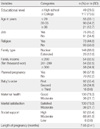Abstract
Purpose
Prenatal depression is associated with potential negative consequences for the mother and infant. The purpose of this study was to examine pregnant women's stress, and depression and their impact on maternal-fetal attachment and fetal growth.
Methods
Data were collected by means of a questionnaire and fetal sonogram from a convenience sample of 166 pregnant women.
Results
Women who have a low educational level, poor health and are dissatisfied with their marriage showed low maternal-fetal attachment. Prenatal depression had significant correlations with length of pregnancy and level of stress. Even though correlation between maternal stress and fetal weight (r=-.15, p=.099) and correlation between maternal depression and maternal-fetal attachment (r=-.13, p=.095) were not statistically significant, the impact of the prenatal psychological state of mothers can not be ignored as it relates to fetal health.
Conclusion
Maternal-fetal attachment and fetal growth can be affected by maternal emotional state, including stress or depression. These findings suggest that primary care nurses in hospitals and public health centers should provide prenatal depression screening and nursing intervention programs for management and prevention of prenatal stress and depression.
Figures and Tables
References
1. Ahn HR. Experimental study of the effects of husband's supportive behavior reinforcement education on stress relief of primigravidas. 1984. Seoul: Yonsei University;Unpublished doctoral dissertation.
2. Boukydis CF, Treadwell MC, Delaney-Black V, Boyes K, King M, Robinson T, et al. Women's responses to ultrasound examinations during routine screens in an obstetric clinic. Journal of Ultrasound in Medicine. 2006. 25:721–728.
3. Bowen A, Muhajarine N. Antenatal depression. Canadian Nurse. 2006. 102(9):27–30.
4. Cranley MS. Development of a tool for the measurement of maternal attachment during pregnancy. Nursing Research. 1981. 30:281–284.
5. Deave T, Heron J, Evans J, Emond A. The impact of maternal depression in pregnancy on early child development. BJOG: An International Journal of Obstetrics and Gynaecology. 2008. 115:1043–1051.
6. Diego MA, Field T, Hermandez-Rief M, Schanberg S, Kuhn C, Gonzalez-Quintero VH. Prenatal depression restricts fetal growth. Early Human Development. 2009. 85:65–70.
7. Diego MA, Jones NA, Field T, Hermandez-Rief M. Maternal psychological distress, prenatal cortisol, and fetal weight. Psychosomatic Medicine. 2006. 68:747–753.
8. Faul F, Erdfelder E, Lang AG, Buchner A. G*Power 3: A flexible statistical power analysis program for the social, behavioral, and biomedical sciences. Behavior Research Methods. 2007. 39:175–191.
9. Field T. Prenatal depression effects on early development: A review. Infant Behavior and Development. 2011. 34:1–14.
10. Field T, Diego M, Dieter J, Hernandez-Reif M, Schanberg S, Kuhn C, et al. Prenatal depression effects on the fetus and the newborn. Infant Behavior and Development. 2004. 27:216–229.
11. Figueiredo B, Costa R. Mother's stress, mood and emotional involvement with the infant: 3 months before and 3 months after childbirth. Archives of Women's Mental Health. 2009. 12:143–153.
12. Ji JG, editor. Medical dictionary. 2006. 1st ed. Seoul: Academya.
13. Jung MH, Kim JI. A study on the relationship among prenatal emotional status, preparation for delivery, postpartum social support and postpartum blues. Korean Journal of Women Health Nursing. 2005. 11:38–45.
14. Kim HW, Jung YY. Influencing factors on antenatal depression. Korean Journal of Women Health Nursing. 2010. 16:95–104.
15. Kim KY. Effects on maternal-infant attachment by the taegyo perspective prenatal class. 2000. Seoul: Yonsei University;Unpublished master's thesis.
16. Kim YA. Relationship between maternal stress during pregnancy and neonatal stress response. 2007. Seoul: Seoul National University;Unpublished master's thesis.
17. Kwon JH. A test of a vulnerability-stress model of prepartum depression. Korean Journal of Clinical Psychology. 1996. 15:33–43.
18. Kwon MK. Antenatal depression and mother-fetal interaction. Journal of Korean Academy of Child Health Nursing. 2007. 13:416–426.
19. Lee YH, Song JY. A study of the reliability and the validity of the BDI, SDS and MMPI-D Scales. Korean Journal of Clinical Psychology. 1991. 10:98–113.
20. Leigh B, Milgrom J. Risk factors for antenatal depression, postnatal depression, and parenting stress. BMC Psychiatry. 2008. 8:24.
21. Mercer RT, Walker LO. A review of nursing interventions to foster becoming a mother. Journal of Obstetric, Gynecologic, and Neonatal Nursing. 2006. 35:568–582.
22. Nakamura Y. Nursing intervention to enhance acceptance of pregnancy in first time mothers: Focusing on the comfortable experiences of pregnant women. Japan Journal of Nursing Science. 2010. 7:29–36.
23. Nelson LJ, Fazio AF. Emotional content of talk to the fetus and healthy coping behaviors during pregnancy. Infant Mental Health Journal. 1995. 16:179–191.
24. O'Connor TG, Caprariello P, Blackmore ER, Gregory AM, Glover V, Fleming P, et al. Prenatal mood disturbance predicts sleep problems in infancy and toddlerhood. Early Human Development. 2007. 83:451–458.
25. Park MK, Lee YS. The relationship among stressful life events, maternal-fetal attachment behaviors and childbirth variables during pregnancy. Journal of the Korean Society of Maternal and Child Health. 1999. 3(1):47–61.
26. Pascoe JM, French J. Third-trimester maternal psychosocial factors and infants' home stimulation: a prospective study. Archives in Family Medicine. 1993. 2:624–627.
27. Rahman A, Bunn J, Lovel H, Creed F. Association between antenatal depression and low birth weight in a developing country. Acta Psychiatrica Scandinavica. 2007. 115:481–486.
28. Rahman A, Iqbal Z, Bunn J, Lovel H, Harrington R. Impact of maternal depression on infant nutritional status and illness: a cohort study. Archives of General Psychiatry. 2004. 61:946–952.
29. Schore AN. Effects of a secure attachment relationship on right brain development, affect regulation, and infant mental health. Infant Mental Health Journal. 2001. 22:7–66.
30. Yarcheski A, Mahon NE, Yarcheski TJ, Hanks MM, Cannella BL. A meta-analytic study of predictors of maternal-fetal attachment. International Journal of Nursing Studies. 2009. 46:708–715.




 PDF
PDF ePub
ePub Citation
Citation Print
Print






 XML Download
XML Download